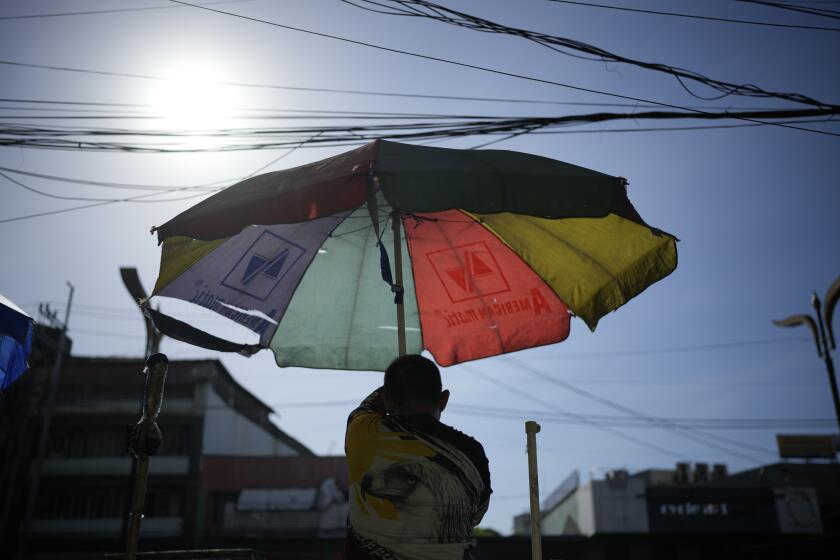Scandals May Be Undoing of Italian Politicians : Vote: Mayoral elections in 428 cities could see a revolt against ingrained political system.
In the midst of a national electoral revolution, Romans are lending their ears to a young, telegenic countryman named Francesco Rutelli, who promises a return of bygone splendor to the Eternal City.
Addressing a street-corner rally from the back of a flatbed truck one night last week, Rutelli, a fresh-faced, designer-dressed Green, embodies new-age Italian politics.
Never mind that his crowd is small, that the environmentalist’s truck is a diesel, that the anti-traffic crusader is parked in a no-parking zone or that, oratory-wise, Cicero can rest easy. Rutelli--a fast-talking 39-year-old part-time journalist who gets around the city on a motorbike--is the clear favorite to become the next mayor of Rome.
“These elections mean people are no longer enslaved by the political parties. The result will be more direct and more responsible government,” Rutelli told The Times before the rally. His promises of parks, greenery, bike paths, streamlined bureaucracy, traffic control and anti-pollution measures to bring civility back to city life are echoed by newcomer candidates wooing voters up and down the Italian peninsula.
Precursor to national elections early next year, mayoral votes in 428 Italian cities today will effectively ring down the curtain on a half-century-old political system that has collapsed in scandal and disgrace.
More than 3,000 politicians and business leaders have been implicated in scams that paid illegal hundreds of millions of dollars to political parties as kickbacks for public contracts.
Italians are fed up.
The election promises to be a feast for the young and the bold, the untried and the untarnished among Italian politicians.
Rome, Naples, Palermo, Genoa, Venice and Trieste are the largest among the cities in which 11 million voters will choose mayors under new electoral rules for the first time. With multi-candidate races everywhere, most cities will see a Dec. 5 runoff between their top two finishers today.
By most accounts, voters will massively repudiate Establishment parties wrecked by a 20-month investigation of the gargantuan scandal that secretly underwrote Italian politics for decades.
The dominant Christian Democrats and the Socialists, their allies through nearly half a century of coalition governments, are expected to be notable victims.
Indeed, polls in Rome and other major cities show a remarkable collapse of a political center long boosted by anti-communism and embodied by the Christian Democrats.
Protesting voters are migrating increasingly into the twilight world of post-leftism, populism, reformism and neo-fascism.
The parties that have benefited most are the newborn populist-regionalist Northern League and the reborn, always-a-bridesmaid former Communist Party, now called the Democratic Party of the Left and known as the PDS for its acronym in Italian.
What Italians object to is that corruption, inefficiency, greed and the abuse of power are virtually institutionalized at all levels of public life.
Last week alone, 23 gravediggers and an official at Turin’s main cemetery were accused of stealing jewelry and gold teeth from corpses; four doctors in Naples were arrested for selling, sight unseen, a “natural-causes” death certificate to anyone with a corpse and awkward circumstance.
Such outrages are grist for new-breed pols and parties untainted by power’s corruption.
In Rome, Rutelli, supported by the now social democratic PDS, leads the polls, followed by Gianfranco Fini, 41-year-old national leader of the neo-fascist Italian Social Movement. The Christian Democrat, a 61-year-old government administrator named Carmelo Caruso, trails badly.
In Naples, former Communist Party official Antonio Bassolino, 46, candidate of a broad leftist alliance, leads narrowly in late polls against neo-fascist Alessandra Mussolini, 30, the granddaughter of former dictator Benito Mussolini and the niece of actress Sophia Loren.
Before the scandal, Christian Democrats and Socialists drew 60% of Naples’ vote. This time, polls give no chance to their joint candidate, Massimo Caprara.
Caprara served more than a decade in Parliament, as a Communist, and as mayor of a town outside Naples, as a Communist.
In a twist all’americana , it is now the candidates who count more than their parties.
In all Italian elections until this year, voters chose party lists.
The mayor typically emerged from murky intraparty negotiations that usually produced an often contentious coalition of four or five parties.
Now, the municipal electoral game focuses on individuals, and it is more open: Parties must declare in advance with whom they will ally.
To make governing easier, the party or alliance behind the winning candidate gets at least 60% of council seats.
Across the country, there are new players with names as disparate as they are unfamiliar: Popular Christians, National Alliance, Conscience for Naples, Central Union, Ligurian League. Slovenian Union. The Group.
Not everybody is impressed: One newspaper proclaimed a lackluster seven-candidate field in the Piedmont city of Alessandria “the seven dwarfs.”
In Palermo, leftist-supported former Mayor Leoluca Orlando, head of a national anti-Mafia party called La Rete (The Network), seeks a new term as candidate of a new party called Palermo Liberates Palermo. He is challenged by Elda Pucci, a centrist former mayor.
Philosopher Massimo Cacciari, a well-known former Communist, narrowly leads the polls in Venice. The principal challenger is newcomer Aldo Mariconda, a business consultant running as candidate of the young, confrontational and autonomy-minded Northern League, known as the Lega Nord.
Beneficiary of revolt against the Establishment, the Lega Nord won the Milan mayoralty in June.
This time around, Lega founder Sen. Umberto Bossi, the emerging new power in Italian political life, has campaigned hard in Venice.
More to Read
Start your day right
Sign up for Essential California for news, features and recommendations from the L.A. Times and beyond in your inbox six days a week.
You may occasionally receive promotional content from the Los Angeles Times.






